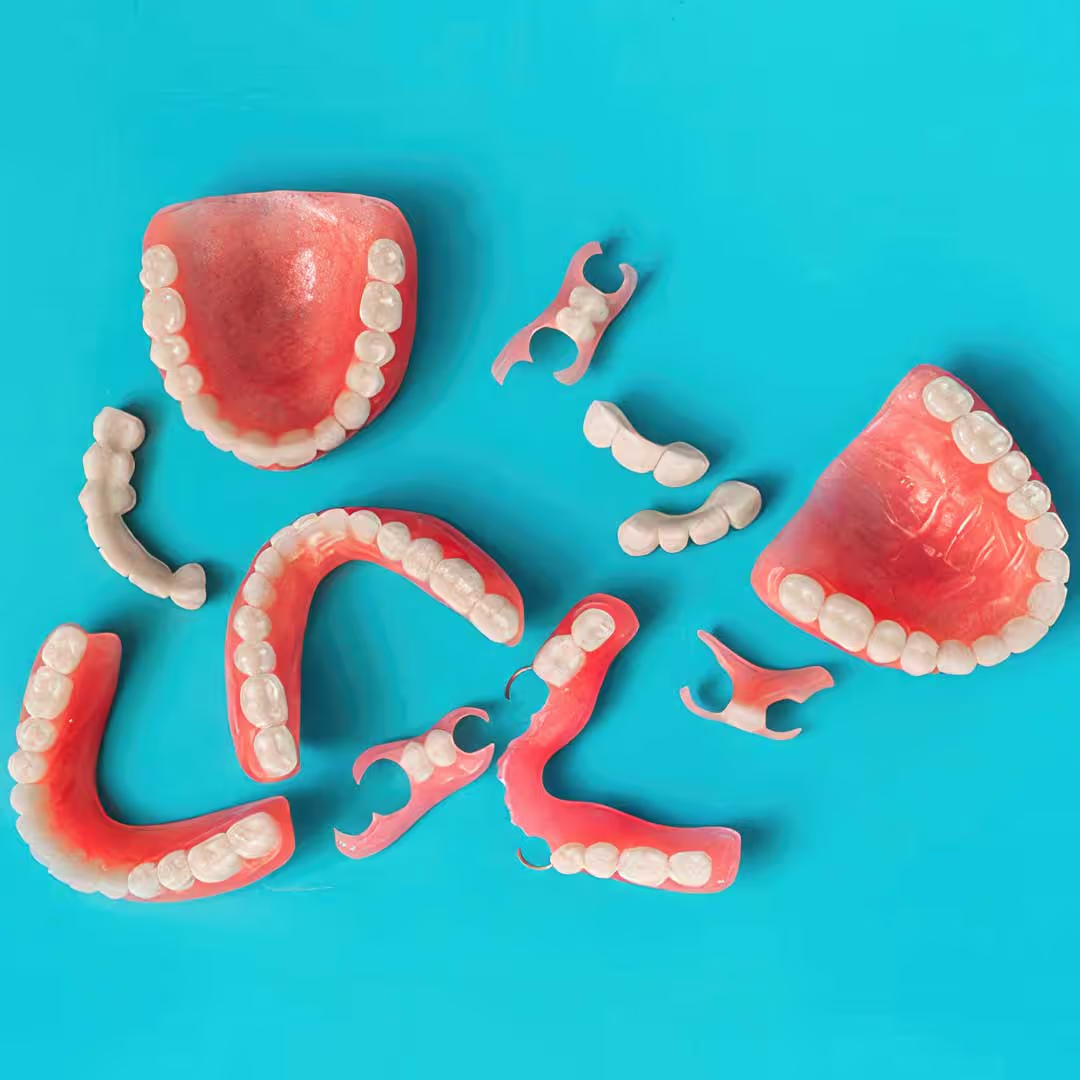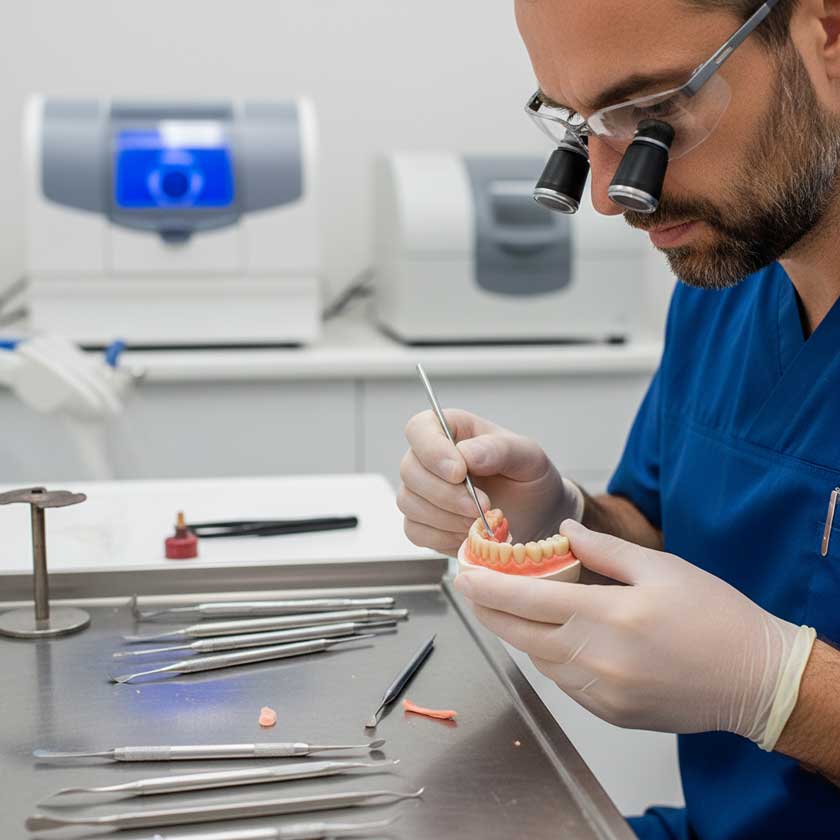Picking the correct denture is crucial for your oral health and overall well-being. With the variety of denture options available, it's essential to understand the factors that should influence your selection. Different denture types and materials are important for finding the right denture that fits well and is comfortable.
This article will assist you in selecting the appropriate denture. We will discuss important factors to consider and the available options. If you need dentures for some missing teeth or all teeth, we will discuss the factors to help you decide. We will also delve into denture materials, maintenance, care, comfort, and the associated costs.
Key Takeaways:
- Understanding your denture needs and unique situation is crucial in making the right choice.
- Consider factors such as denture types, materials, fit, comfort, and budget when selecting a denture.
- Consulting with dental professionals and denture providers will ensure you receive expert guidance.
- Proper denture maintenance, care, and regular check-ups are essential for long-term oral health.
- Managing your expectations and connecting with others who have had denture experiences is beneficial.
Understanding denture options.
Dentures offer a range of options to restore your smile and oral function by replacing missing teeth. Whether you need to replace a few teeth or all of them, a denture solution can meet your needs. Here are some of the different denture options to consider:
- Partial Dentures: Dentists use them when you have a few missing teeth and need to fill in the gaps. They have a design that blends in with your natural teeth; you can remove or fix them.
- Full Dentures: Full dentures are a suitable option if you have lost all of your teeth on the upper or lower jaw. They replace all your missing teeth and support your facial muscles.
- Dental implants hold these dentures in place, providing stability and improved function. They offer a more secure fit compared to traditional dentures.
- Snap-On Dentures: These dentures use anchors or snaps to attach to dental implants, offering added security and stability. They are easy to remove for cleaning and maintenance.
- Flexible dentures provide comfort and a good fit in your mouth due to their construction from a flexible material. They are also lightweight and durable.
- Temporary Dentures: Dentists use these dentures as a temporary solution while they make your permanent dentures. They allow you to have teeth immediately after tooth extraction.
- Same-Day Dentures: In some cases, you can receive your dentures on the same day as your tooth extractions. This allows you to have a complete set of teeth without a waiting period.
- Affordable Dentures: There are denture options available at different price points to suit various budgets. You can discuss your financial considerations with your dental professional to find an affordable solution.
You can choose from various denture options to find the best solution for your needs. Whether you need to replace a few teeth or all of them, there is an option available for you. Talking to a dentist will help you choose the right dentures for your mouth and lifestyle.
Choosing between full and partial dentures.
When deciding on dentures, you must choose between full or partial dentures as a replacement for missing teeth. Full dentures replace all the teeth on either the upper or lower jaw or both. Upper dentures cover the upper palate, while lower dentures rely on the gums and muscles for stability.
However, people use partial dentures when they need to replace one or more teeth. These dentures can be either removable or fixed, depending on your preference and the recommendation of your dental professional. You can design partial dentures in different ways, such as using clasps or precision attachments to hold them in place.
When choosing dentures, talk to your dentist to find the best option for your teeth and mouth. They will consider factors such as the number of missing teeth, the condition of your remaining teeth, and your overall oral health. They will assess your situation and help you make an informed choice. Their goal is to ensure the best outcome in both appearance and performance.

Exploring denture materials.
When it comes to dentures, there are various materials to choose from based on your individual needs and preferences. Each material offers its own unique set of benefits and considerations.
Acrylic dentures
Acrylic dentures are a popular choice due to their durability and affordability. They have a lightweight design, and users can easily adjust and repair them if necessary. However, they may not be as strong as other materials and are prone to staining over time.
Metal dentures
Metal dentures, such as those made from cast metal or hybrid materials, offer strength and a smaller profile in the mouth. They are highly durable and resistant to breakage. However, they may be more expensive than acrylic dentures and can cause allergies in some individuals.
Porcelain dentures
Porcelain dentures provide a natural appearance, closely mimicking the look and feel of real teeth. They are highly resistant to staining and do not wear down easily. However, porcelain dentures are more prone to fracture and may require extra care to avoid damage.
Hybrid dentures
Hybrid dentures are a combination of acrylic and metal materials. They offer both benefits: strength, durability, and a more natural appearance. Hybrid dentures may be suitable for individuals who desire a balance between aesthetics and functionality.
Valplast dentures
Valplast dentures are made from a flexible nylon material that offers exceptional comfort and durability. They are lightweight and adapt well to the natural shape of the mouth, providing a snug fit. Valplast dentures may be an ideal choice for individuals with sensitive gums or allergies to other denture materials.
Nylon dentures
Nylon dentures, similar to Valplast dentures, are flexible and lightweight. They are resistant to fractures and are highly durable. Nylon dentures also offer a high level of comfort and are less likely to cause irritation or sore spots. However, they may not be as widely available as other denture materials.
Flexible partial dentures
Flexible partial dentures are a removable tooth replacement option using a flexible base material. They are comfortable to wear and offer a natural-looking appearance. Flexible partial dentures can be a suitable alternative to traditional metal or acrylic partial dentures for individuals who prefer a more flexible and comfortable option.
Cast metal dentures
Cast metal dentures are made with a metal framework and are known for their strength and durability. They can withstand heavy biting forces and are less likely to break or wear down over time. However, cast metal dentures may be more expensive than other materials and require regular maintenance to prevent corrosion.
Denture fit and comfort: Key factors for a confident smile.
A functional and confident smile is essential to achieve a proper fit and optimal comfort in dentures. Here are some important considerations to ensure your dentures fit flawlessly and provide the comfort you deserve:
Fitting and adjustments.
Proper denture fittings are crucial to ensure a secure and comfortable fit. Your dental professional will assess your jaw structure, bite alignment, and gum contours to create custom dentures that fit your unique oral anatomy. Regular adjustments may be necessary, especially during the initial period of wearing dentures, to fine-tune the fit and alleviate any discomfort or irritation.
Pain and discomfort.
If you experience any pain or discomfort while wearing your dentures, it may be a sign that adjustments or repairs are needed. Common issues include sore spots, pressure points, or ill-fitting dentures that cause friction against your gums. It's important to communicate any discomfort to your dental professional so they can make the necessary adjustments to ensure your dentures fit comfortably.
Addressing loose dentures.
Loose dentures can be a source of frustration and discomfort. Over time, jawbone structure or gum tissue changes can cause dentures to become loose or ill-fitting. We may recommend denture repair, relines, or rebases in such cases.
Denture relines improve the fit of dentures by adding material to the inside. Denture rebasing, on the other hand, replaces the entire base for a more secure fit. Your dental professional can assess your situation and recommend the appropriate solution.
Open and honest communication with your dental professional is crucial for addressing denture-related concerns and ensuring optimal fit and comfort. To have a confident smile and enjoy well-fitted dentures, go to regular appointments and get professional help.
Maintaining and caring for dentures.
Proper maintenance and care are crucial for the longevity of your dentures. Here are some important tips to keep in mind:
- Use denture adhesives to provide extra stability and confidence while wearing dentures. These adhesives can help prevent slipping or shifting.
- Regularly clean your dentures to keep them free from stains, bacteria, and odors. Brush your dentures with a soft-bristle brush and use denture cleaning solutions or soaks to clean them thoroughly.
- Consider using ultrasonic denture cleaners, which use high-frequency sound waves to provide a deep and thorough clean. These cleaners are effective in removing stubborn stains and debris.
- Proper denture storage is important when not wearing them. Keep your dentures in a storage case or a glass of water to prevent them from drying out and losing shape.
- Follow the recommended cleaning and maintenance routines provided by your dental professional to ensure the longevity of your dentures.
By following these care and maintenance practices, you can keep your dentures in good condition, ensuring they provide the comfort and functionality you need.
Understanding denture costs.
One of the important considerations when choosing dentures is the cost associated with the treatment. Denture costs can vary depending on factors such as materials, customization, and additional services required. It's essential to discuss denture costs with your dental professional before proceeding with treatment.
Affordable denture options are available, and many denture clinics offer payment plans to help ease the financial burden. Some insurance plans may also cover a portion of denture costs, and it's worth exploring if Medicare provides coverage for certain denture services.
Having a candid conversation with your dental provider about your budget and exploring all available options is important. They can provide you with a breakdown of costs, explain any warranty or coverage included, and guide you towards the most suitable denture solution that fits your needs and financial situation.
Exploring additional denture considerations.
Adjusting to life with dentures may require some adaptations. Here are a few important factors to consider:
Eating with dentures.
When eating with dentures, starting with soft foods and gradually introducing harder foods as you become more accustomed to chewing is important. Cut your food into smaller pieces and chew slowly and evenly on both sides of your mouth. Avoid sticky or hard foods that may dislodge your dentures.
Speaking with dentures.
Speaking with dentures may feel different at first, but you can regain your confidence with practice. Remember to speak slowly and enunciate clearly. If you notice any difficulties or changes in your speech, consult your dental professional for adjustments.
Sleeping with dentures.
Removing your dentures while sleeping is generally recommended to allow your gums and jaw to rest. This can help prevent soreness and discomfort. If you prefer to keep your dentures in, make sure to clean and rinse them thoroughly before wearing them again in the morning.
Denture adhesives and cleaning.
You can use denture adhesives such as glues, pastes, or powders to enhance denture stability. These products can provide extra confidence and hold your dentures in place throughout the day. When cleaning your dentures, use a denture cleanser and a special denture brush to ensure a thorough cleaning without causing damage to the surface.
Exploring denture alternatives.
While dentures are a common solution for tooth replacement, alternative options exist. Dental prosthetics, including dental implants, offer a permanent solution that closely mimics natural teeth. Implant-supported overdentures provide stability and improved function, while snap-in dentures and implant-retained overdentures offer additional security.
When comparing dentures to dental implants, factors such as stability, aesthetics, maintenance, and cost should be considered. Dental implants provide a long-term solution by fusing with the jawbone, offering a secure and natural-looking tooth replacement option. Dentures with implants can provide a more vibrant smile and allow for better chewing and speaking capabilities.
"Dental prosthetics, including dental implants, offer a permanent solution that closely mimics natural teeth."
Partial dentures, which replace one or more missing teeth, can be an alternative to full dentures. They are custom-made to fit the remaining teeth and can be removable or fixed in place. Partial dentures offer improved functionality and aesthetics compared to traditional full dentures.
Seeking professional guidance.
When it comes to choosing the right denture, seeking professional guidance is essential. Denture providers, dentists, prosthodontists, dental labs, and dental technicians are the experts who can help you make informed decisions about your denture needs. These professionals have the knowledge and experience to assess your dental situation and provide personalized advice.
You can receive a comprehensive evaluation of your oral health and specific requirements by consulting with a dental professional. They will consider factors such as the condition of your teeth, bone structure, gum health, and any existing dental work. With this information, they can guide you toward the most suitable denture options for your unique situation.
Working with a dental professional also ensures that your dentures are custom-made to fit your mouth and provide optimal comfort and functionality. They will take precise measurements and impressions of your mouth to create dentures that are tailored to your specific needs. Additionally, they can offer valuable insights and recommendations when it comes to selecting the right materials, denture design, and maintenance routines.
Understanding on how to choose the right denture.
Choosing the right denture for your needs involves careful consideration of various factors. It's important to make an informed decision from denture selection to fit, maintenance, care, comfort, and cost. Consulting with a dental professional is key to receiving the best possible care and guidance throughout the process.
By understanding the different denture options available, you can find a solution that suits your unique situation. You can choose from different materials and designs for dentures, whether you need partial or full ones. They look natural and last long.
To keep your dentures in good condition, clean them often and use denture soaks and adhesives. Keeping your dentures clean regularly will help keep them in good condition. Additionally, denture soaks, and adhesives will further improve their overall maintenance. Also, talking to your dentist about what you want and expect will ensure you're happy with the results.
FAQ
How do I choose the right denture for my needs?
Choosing the right denture involves considering factors such as denture type, materials, fit, comfort, and budget. Consulting with a dental professional is crucial to make an informed decision and receive the best possible care.
What are the different denture options available?
Denture options include partial dentures, full dentures, implant-supported dentures, snap-on dentures, flexible dentures, temporary dentures, and same-day dentures. Affordable options are also available.
What is the difference between full dentures and partial dentures?
Full dentures replace all the teeth on either the upper or lower jaw, or both. Partial dentures replace one or more missing teeth and can be removable or fixed.
What materials are dentures made from?
Dentures can be made from various materials, including acrylic, metal, porcelain, hybrid materials, Valplast, and nylon. The choice of material depends on individual needs and preferences.
How do I ensure a comfortable fit for my dentures?
Proper denture fittings, adjustments, relines, and rebases ensure a secure and comfortable fit. Communicating any discomfort or pain to your dental professional is important for optimal comfort.
How do I properly maintain and care for my dentures?
Regular denture cleaning, including brushing and soaking, helps keep dentures clean and free from stains, bacteria, and odors. Denture adhesives can provide extra stability, and proper storage when not in use is recommended.
How much do dentures cost?
Denture costs vary depending on factors such as materials, customization, and additional services. Discussing denture costs with your dental professional and exploring payment plans and insurance coverage is important.
Are there any considerations for eating, speaking, and sleeping with dentures?
Eating with dentures may require caution and adjustments in chewing techniques. Speaking with dentures may feel different initially, but confidence can be regained with practice. Sleeping with dentures is generally not recommended. Denture adhesives and proper cleaning routines can enhance stability and cleanliness.
What are the alternatives to dentures?
Dental prosthetics, including dental implants, offer a permanent solution for tooth replacement. Implant-supported overdentures, snap-in dentures, and implant-retained overdentures provide additional stability and security.
Who should I seek professional guidance from when choosing dentures?
Professional guidance from denture providers, dentists, prosthodontists, dental labs, or dental technicians is important for assessing your dental needs, receiving expert advice, and creating custom dentures.
Are there online communities or resources available for denture support?
Online communities like the Denture Support Australia Facebook page provide a platform for sharing experiences and asking questions. Managing expectations and discussing denture goals with your dental professional is important for personalized care.







